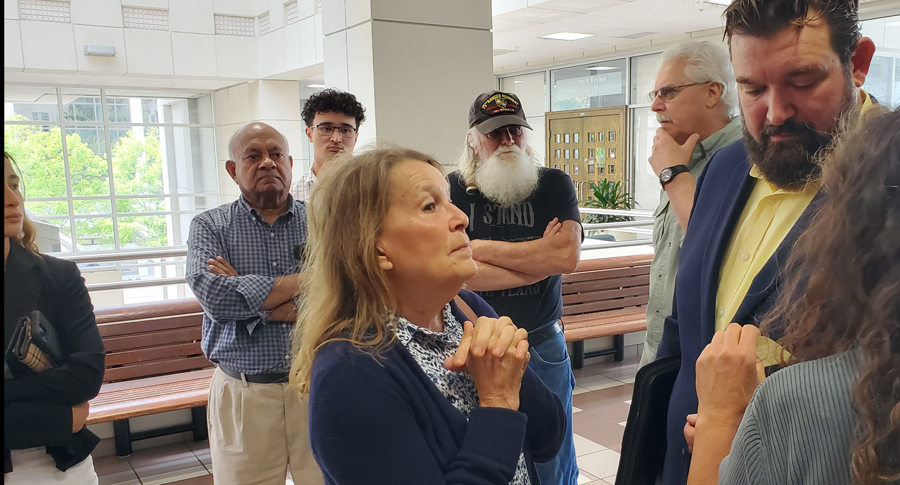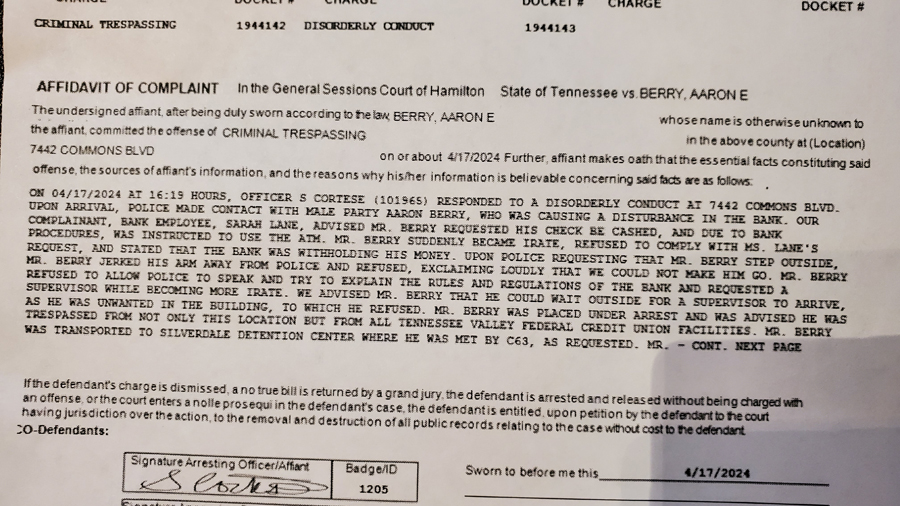
Glenda Pappu and 17 other supporters speak with Aaron Berry, right, after he asks for a grand jury review of criminal charges laid against him by city police. (Photo David Tulis)
CHATTANOOGA, Tenn., Monday, June 3, 2024 — Because we have cops and deputies who disobey constitutional constraints of arrest powers, the county overproduces arrests such as that of veteran Aaron Berry whom today refuses to buckle to the plea bargain mill in sessions court and stands on his rights.
By David Tulis / Copperhead Radio Network
Mr. Berry is in Hamilton County, Tenn., sessions court today to do one thing: Waive the court.
He insists on his right to have a grand jury review the misdemeanor charges leveled against him by city cops at behest of the Tennessee Valley Federal Credit Union after what police call “disorderly conduct.”
“Your honor, I respectfully waive the court and demand my rights to have my case heard by a grand jury of my peers,” he says, standing in front of judge Gary Starnes. The judge directs him to the bailiff deputy to fill out waivers.

This all-caps criminal arrest charging instrument alleges crimes by disabled vet Aaron Berry. The Tennessee Valley Federal Credit Union, described erroneously as a bank, is member owned. It ordered Mr. Berry’s car be towed at a cost to him of F$400. (Photo David Tulis)
 Now warrantless arrest for a misdemeanor is a matter of law in Tennessee. If you are involved in a “public offense” or “threatened breach of the peace” at T.C.A. § 40-7-103, the officer or member of the public can arrest you without a warrant. Mr. Berry’s arrest arguably falls within the exception.
Now warrantless arrest for a misdemeanor is a matter of law in Tennessee. If you are involved in a “public offense” or “threatened breach of the peace” at T.C.A. § 40-7-103, the officer or member of the public can arrest you without a warrant. Mr. Berry’s arrest arguably falls within the exception.

Local sessions court judge Gary Starnes, left, speaks with Tennessee supeme court justice Roger Page at a judicial conference. (Photo AOC)
Because he raised his voice in making a service demand, he was arrested at the Tennessee Valley Federal Credit Union branch in the Hamilton Place mall area of Chattanooga.
Mr. Berry, a former military police officer with PTSD who claims ADA protections for psychological limitations, refused to enter into a cubicle to cash a check. He requested the exchange be done at the open service desk. Mr. Berry called police. The staff convinced officers to arrest the credit union member, whose temper warmed at the denial of accomodation. Grounds were trespass and disorderly conduct. The credit union didn’t want him to leave his car behind when he went to jail, so it ordered it towed, which cost Mr. Berry more than F$400 to redeem.
“They violated several of my constitutional rights and my ADA,” he declares. “They took $400 out of my pocket, sir, and I’m on a restricted budget, and they put me in jail for five hours, a disabled veteran. I didn’t deserve to go.”
Mr. Berry feels a sense of resolve to not just get his case dismissed, but help others fight the system tilted against the citizen for the ease and convenience of the police-industrial system in Hamilton County. “You have to fight the court also so that nobody gets done this way ever again, either.”
Police in Hamilton County operate without restraint as against the rights the people, routinely arresting and jailing people whose cases should never end in arrest or jail and refusing to honor the arrest warrant process 2 ways. (1) Cops don’t get arrest warrants when they should under Tenn. Code Ann. § 40-7-103, the exceptions law stating the circumstances in which cops may arrest a person on the spot. Tennesseans have long been denied protection from Redcoat warrants, thanks to the bar and the courts, whose members don’t object. (2) Chief magistrate Lorrie Miller gives exclusive access to cops and deputies in submitting criminal arrest warrants, relying exclusively on hearsay evidence and rejecting fact witnesses and victims’ standing to present arrest warrants. The latter policy creates bogus arrests, four of which have received notorious coverage (the case of a rape victim, and also of Shameca Burt, Michael James and Tamela Grace Massengale).
Waiving court = remedy for overpolicing
Mr. Berry, prior to the hearing, expected Judge Starnes to propose the veterans court. “You honor, I don’t need to go to the veterans court,” he planned to say, “I want a jury of my peers, the people of the community, the county of Hamilton.”
He says he has regard for the common people on the jury. “I’ve always had confidence in my American brothers and sisters, and my fellow [Tennesseans].”
“I’m not granting jurisdiction to your court,” says Mr. Berry, testing his pitch ahead of time. “I’m going up higher. I want my case recorded.” The sessions court is “not qualified” to hear the case.
Mr. Berry says that if the grand jury issues an indictment he will resist strenuously, declaring his status and rights as one of the people of Tennessee under Tenn. const. art. 1, and compel his accusers to carry 100 percent of the burden of proof. Due process violations by rogue cops are commonplace, subsidized by the plea bargain mill in which only the rarest case goes to trial, and insufficiency and contempt of the people lodge like cancers in the charging instruments of many, many cases.
“I’m needing to go further,” Mr. Berry vows. “I’m needing justice for this situation because they’re doing it to my other brothers and sisters who are veterans, and we don’t deserve it because we fought for them rights.”

